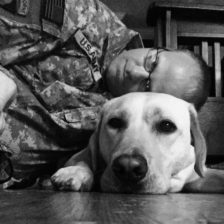I saw a hashtag and it made me stop in my tracks.
#StruggleDoesNotHaveALook
We often think that mental health issues have a “look,” or have a way to be defined. That is not the case. In our home, PTSD rears its ugly head from time to time, and while there’s no real “look” to it, we see signs: depression, anxiety, isolation, frustration, lots of sleeping (or trying), and sometimes silence. Keeping feelings in.
The author of this hashtag, Dana Dewedoff Carney, created this when she started RISE-For Women. Rise, a non-profit organization for women, is a place where women who have suffered child loss can come, in a community (if you live in New Jersey, you can more than likely visit their location, and if you are online, you can join their Facebook community), to discuss and share their stories and connect with others.
So many times we see struggle in various ways. For Veterans, it could be their return home. It could be the reintergration into society and how they are coping with life outside of the military. For some, it might be dealing with the loss of a loved one, spouse or significant other, or even child.
Struggle does not have a look.
Often times we will say, “I’m fine,” and that may not even be the case. We may not feel fine, but maybe that “fine” means angry, sad, ashamed, depressed, alone, tired, trapped, invisible, sensitive, or others…There have been times where those feelings and emotions are very real and very much in our home.
Struggle does not have a look.
Talking with someone can be a big help. I know when I feel easily frustrated, talking or figuring out a way to communicate (even journaling) can help. Communicating with Sam is a big key in our relationship, I really feel that because of the way we communicate, we are able to work through certain situations.
Struggle does not have a sound, a look, a gender, an age, or even a stereotype. We (society, people) can all struggle in various areas of our life. Maybe you struggle with your job. Perhaps you have a loved one who is ill and you struggle with their illness or being a caregiver. You can even struggle with your children.
Know that you are not alone. For the longest time I was not sure how to go about being a caregiver or being a military spouse. It took some reaching out and some communication, and you know what, I found a tribe. I found people who get me for me, and who understand the circumstances in our life.
Seek help. Even if it is meeting a friend for coffee to vent (hey, I love coffee by the way). I am here, I see you, I am in your corner.
Know that struggle does not have to be something you face alone.

